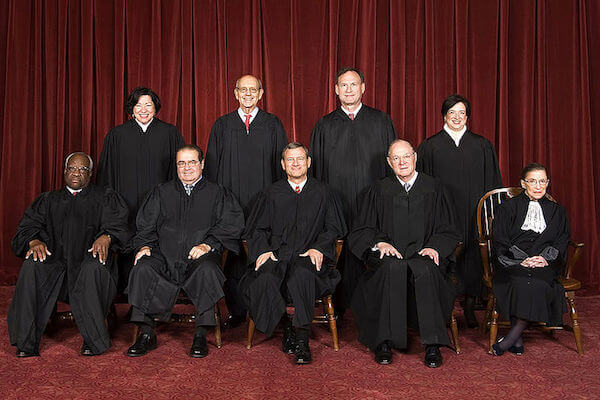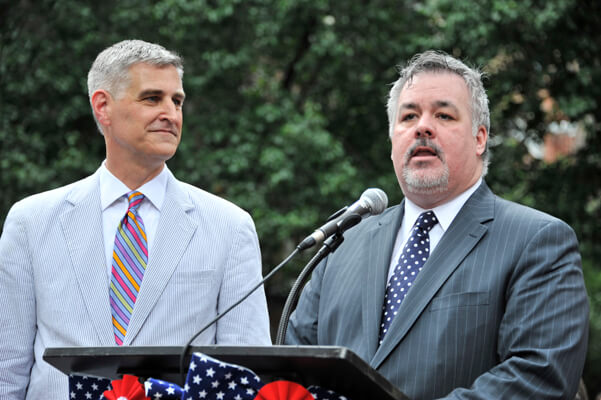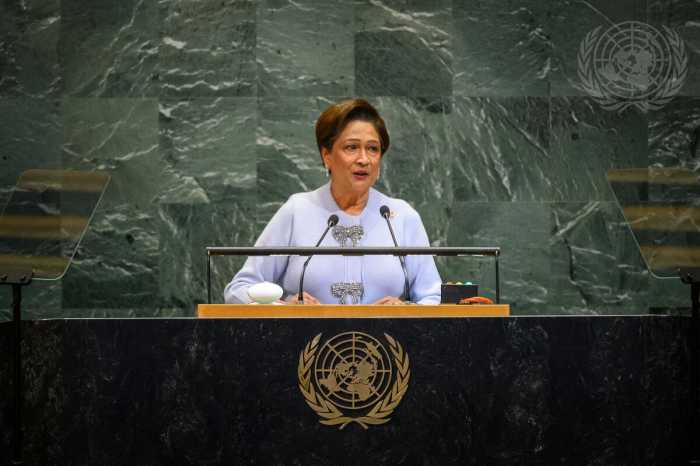Attorneys representing the two same-sex couples challenging California’s Proposition 8 have now filed their response to the brief submitted to the Supreme Court in January by those defending the 2008 voter initiative. In addition, the City and County of San Francisco, which was allowed to intervene as a co-plaintiff in the case, has also filed its response.
The two respondent parties share the goal of restoring marriage equality to California, but the distinctions between the roles they play in the case are reflected in differences in focus between the two briefs, both filed on February 21.
February 21 filings respond to group defending 2008 voter initiative
For the four plaintiffs and their attorneys, hired in 2009 by the American Foundation for Equal Rights (AFER), the ultimate goal is having the Supreme Court rule that same-sex couples have an equal right with different-sex couples to marry anywhere in the United States. Their brief never loses sight of their challenge in getting the high court to that point.
They argue, briefly, that the Official Proponents of Prop 8 — allowed to intervene by the US district court in the absence of the state of California defending the voter initiative — lack constitutional “standing” to appeal that same district court’s decision striking down the anti-gay ban.
Alternatively, AFER also argues that if the high court finds that the Proponents have standing, it should affirm the Ninth Circuit’s narrow ruling that Prop 8 is invalid because there was no rational justification for withdrawing the right to marry that same-sex couples in California enjoyed prior to its passage.
Attorneys for the plaintiff couples, however, turn their main firepower on the underlying question, evaded by the Ninth Circuit, that the Proponents have put to the Supreme Court: Does it violate the 14th Amendment of the US Constitution for any state to deny same-sex couples the same right to marry that different-sex couples have?
By contrast, the San Francisco brief focuses more extensive attention on the standing question. When it turns to the merits of the case, the city’s attorneys focus primarily on the Ninth Circuit holding that there was no rational basis for California to withdraw the right same-sex couples enjoyed to marry after the State Supreme Court granted that earlier in 2008.
The arguments on merit made by AFER and San Francisco are, in some respects, similar, since both hope to persuade the high court that the Proponents’ purported justifications for Proposition 8 are pathetically inadequate. In focusing their arguments differently, however, AFER and the city give the Supreme Court plausible alternatives for reaching a result that could either revive same-sex marriage in California or extend it across the nation.
There has been a lot of commentary about what would happen if the high court agrees that the Prop 8 Proponents lack standing to bring their appeal. That conclusion would not only rob the Supreme Court of jurisdiction but also mean that the Ninth Circuit Court of Appeals similarly lacked jurisdiction to hear an appeal from Prop 8’s defenders. That would leave District Judge Vaughn Walker’s 2010 ruling — which found a sweeping 14th Amendment right to marriage by any same-sex couple in the nation — in place and unappealed.
Some commentators have suggested the Walker ruling would only apply to the four plaintiffs and the two county clerks who denied the couples licenses. Prop 8’s Proponents make this argument, noting the case was not brought as a class action on behalf of all unmarried same-sex couples in California nor were all county clerks in California certified as a defendant class.
The briefs from AFER and San Francisco both attack this argument, but the city develops it at greater length, which is logical given its primary goal of restoring same-sex marriage in California — and, particularly, in San Francisco, whose city clerk was not one of the defendants.
Both briefs argue, persuasively, that if Prop 8 is unconstitutional as to the plaintiffs, it is also unconstitutional as to all similarly situated people — including, at a minimum, all other same-sex couples seeking to marry in California. San Francisco’s brief also argues that since county clerks act as agents of the state on marriage matters, a ruling against a public official carrying out a state function would have effect across California.
These arguments are very convincing and should allay any fear that beating Prop 8’s defenders on the standing issue would have no immediate effect beyond just two same-sex couples.
While the brief filed on behalf of the two plaintiff couples does address the standing question, San Francisco’s brief eagerly pursues it, since it is a potential big winner for its constituency of gay and lesbian couples in that city. And they have great arguments to make.
The city attorneys’ research uncovered a particularly helpful authority to cite — a law review article authored by Chief Justice John Roberts in 1993, when he was still a practicing lawyer. Roberts argued that Congress cannot “ask the courts in effect to exercise… oversight responsibility at the behest of any John Q. Public who happens to be interested in the issue.”
In line with this argument, the San Francisco brief also makes the point — calculated to strike terror in the hearts of federal judges! — that if the Proponents’ standing is upheld, then the initiators of every future voter referendum will write into their ballot question a provision authorizing them to defend it in court should state officials decide not to. Similarly, in enacting statutes, state legislatures might prospectively confer standing on themselves to guard against the risk a future governor might choose not to defend particular laws.
On the merits, the City of San Francisco sharply disputes the Proponents’ attack on the Ninth Circuit ruling striking down Prop 8, while also taking on the initiative’s purported justifications. As the California Supreme Court found when it reviewed Prop 8, the only effect of the 2008 referendum is to deny same-sex couples the label of marriage, since California’s Domestic Partnership Law confers all state law rights of marriage on legally-partnered same-sex couples and state family law treats same-sex couples and different-sex couples with just about total equality when it comes to parenting rights and responsibilities.
The heart of the Proponents’ justification for Prop 8 is that it encourages responsible procreation by heterosexual couples, but the San Francisco brief cogently points out that the referendum did not affect California law relating to procreation and parenting in any way — other than to disadvantage the children raised by same-sex couples who are barred from marrying.
Prop 8, the San Francisco brief argues, had nothing to do with procreation and everything to do with taking rights away, and the city’s attorneys devote considerable attention to the nasty campaign waged by Prop 8’s Proponents. Since the initiative fails even that most lenient standard for judicial review — showing that it had a rational basis — the city’s brief makes no argument that it should be subjected to a more demanding degree of scrutiny.
The AFER brief covers many of the same points as San Francisco’s but is most forceful in making a broad-ranging equal protection argument that seeks to place this case in the mainstream of Supreme Court equal protection jurisprudence. It devotes little attention to defending the Ninth Circuit’s approach, which trimmed back the sweeping implications of Judge Walker’s ruling in the district court. AFER’s aim is get the issue refocused on the way Walker’s decision spelled it out.
AFER does a brilliant job of countering the argument made by Prop 8’s Proponents that the referendum must merely survive a rational basis challenge. The plaintiffs’ brief argues that cases involving sexual orientation discrimination demand either strict scrutiny or heightened scrutiny — either of which places the difficult burden on Prop 8’s defenders of showing a significant government interest that it was narrowly tailored to achieve.
“The undisputed fact that gay men and lesbians have been subjected to a history of discrimination based on a trait that bears no relationship to their ability to contribute to society is sufficient, in and of itself, to render classifications based on sexual orientation ‘suspect’” — a conclusion that would trigger strict scrutiny, the most searching form of judicial review.
Still, AFER is deft in not trying to force the question of strict versus heightened scrutiny. With nearly nine years of history of same-sex marriage in Massachusetts, Prop 8’s defenders cannot conceivably demonstrate the sorts of horrible consequences they have hypothesized in order to meet the burden that any form of heightened scrutiny would demand of their arguments.
Perhaps the most important achievement of the briefs from both AFER and the City of San Francisco, however, is their success in arguing that the concept of marriage described by Prop 8’s defenders is out of touch with reality and was merely invented for the purpose of litigation, with no relationship to the arguments they made to win the vote in 2008. The Proponents, in their brief last month, conspicuously failed to acknowledge the personal aspect of marriage. In their argument, marriage is all about children and not about the marital partners and their relationship. And they act as though same-sex partners don’t have children.
In response, AFER and San Francisco made the more common sense case that marriage is about love, devotion, making a life together, forming a family (which may include children), and taking responsibility for each other. The San Francisco brief reiterates several times the evidence in record of approximately 40,000 children being raised by same-sex couples in California — and forcefully makes the point that denying marriage to their parents disadvantages them. Both briefs find support for the non-child-centered elements of marriage in prior Supreme Court rulings.
AFER’s first-rate advocates should be acknowledged for their achievement. David Boies (and his colleagues at Boies, Schiller & Flexner) and Theodore B. Olson (and his colleagues at Gibson, Dunn & Crutcher) have turned out a brief that is a true masterpiece — precise and passionate, every word calculated to make its mark.
And San Francisco City Attorney Dennis J. Herrera can be proud of the powerful brief produced by his chief deputy, Therese M. Stewart.
The next stage in the Prop 8 case will be the filing of amicus briefs in support of AFER and the City of San Francisco, and then a reply from the Prop 8 Proponents. Oral argument at the Supreme Court takes place on March 26.
The immediate drama now focuses on the White House, where President Barack Obama is under mounting pressure to authorize the Justice Department to file an amicus brief in this case. The federal government is not a party to this case and is busy preparing to challenge the federal Defense of Marriage Act in the oral arguments to be held on March 27. Many of the arguments that the solicitor general will make in attacking the “justifications” for DOMA are pertinent to the Prop 8 case — not least the question of the standard for judicial review — so filing an amicus brief here would be redundant from a legal point of view. It could take on great meaning, however, in terms of strategy and the signals it sends to both the Supreme Court and the public.



































